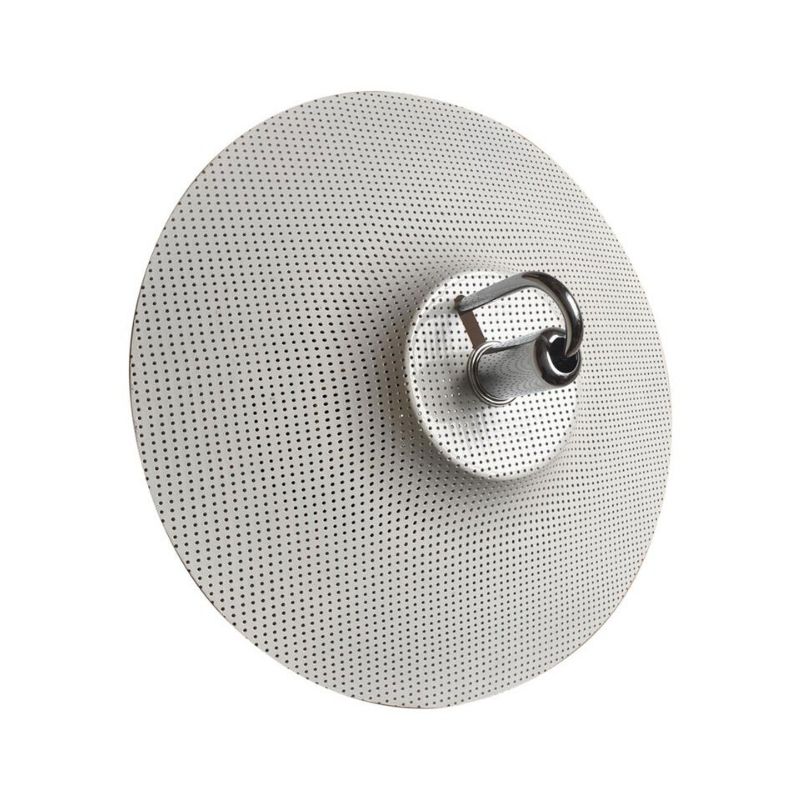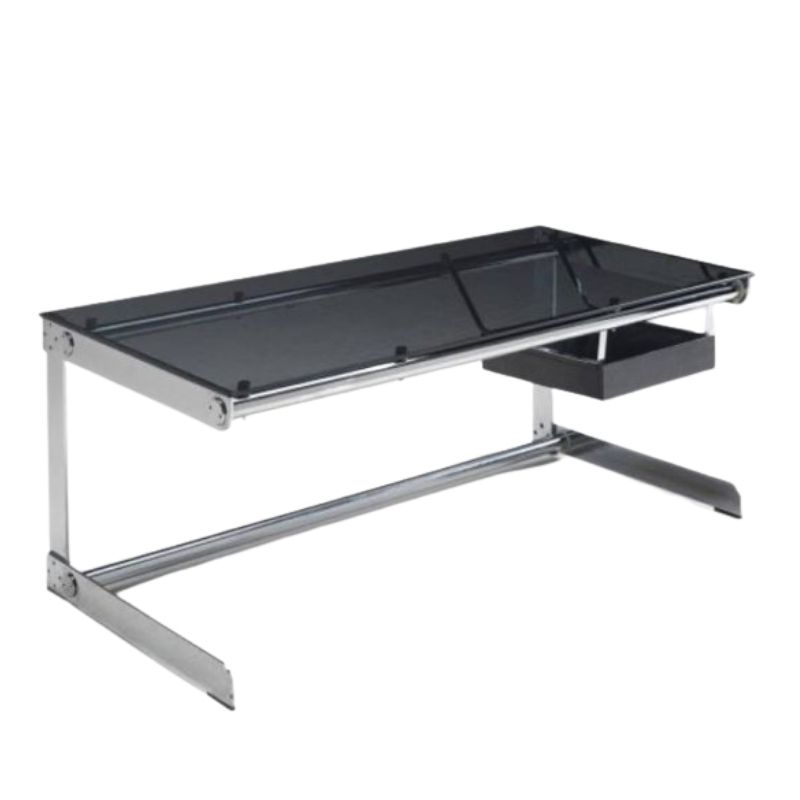alarm clock
Everything I seem to find uses batteries.
http://www.retromodern.com/item_detail.asp?2827.
Battery dilemma
I don't have access to a WIlliam McDonough-style life-cycle analysis of batteries vs. house current, so I can't say for sure whether the air pollution, fly-ash production, coal-mining (or God forbid, nuclear-technology) damage, and human misery related to power generation is less pernicious than the chemical manufacturing, shipping, packaging, and disposal evils of an equivalent number of AA batteries throughout the life of the clock. I just don't have any way of knowing. Maybe it all cancels out. Maybe there are factors we haven't thought of yet. Intuitively, I agree with Olive, and I wear a stem-wound watch rather than a battery-powered one for the same reason. If I were as pure of heart as I'd like to be, AND convinced that house current is the way to go, I'd get a clever friend to piece together an AC adapter from Radio Shack parts and install a power cable on the best-looking battery-powered clock I could afford. But first I'd have to do a life cycle analysis on the Radio Shack bits and pieces (including packaging), plus the gasoline my friend would burn in making the trip to my house... Hey, wait, suppose I adapt the battery clock for house curent, then decide to run my house on solar cells! Will the pollution generated in the production of silicon, etc. for the solar cells (as well as transporting them by truck to my house) de-offset the pollution that would be caused by using batteries? Believe me, I'm not making light of the issue, and I deeply respect the impulse behind this whole conversation, but it occurs to me that maybe I should re-direct my clock-worrying time and energy into some effort (political action?) that might yield a more nearly measurable positive impact on the planet. I'll shut up now.
just throw it over...
This alarm clock by Nina Tolstrup for Lexon seems quite simple in shape and operation. To turn it off, you just have to throw it over. (don't know if it's possible to switch it to 12 hour system though)
http://www.greenergrassdesign.com/lexononoffbyninatolstrup.html
Geo.
Lol. You must never stop thinking.
I just wouldn't want my clock to run out of batteries in the middle of the night. I'm late to work enough as it is! Do most battery powered clocks have a low battery sensor? I have never owned one. I have just always owned an ugly alarm clock. This thread is making me question mine... but perhaps the most earth-friendly thing for me to do is put my aesthetic preferences aside until my clock dies. Throwing away a working clock could not be good.
Something else to think about...
Not only the aesthetics of the clock itself.... My greatest tribulation is the sound of the alarm... I have to hunt out the gentle chirping alarm that DOES NOT ramp up... Just a soft and "un-alarming" wake up... Some of the alarms on the market will send you right into a coronary...
another battery clock option
This clock seems to be popular with some of the folks over at apartmenttherapy.com.
http://www.llbean.com/webapp/wcs/stores/servlet/CategoryDisplay?page=moo...
Why two twelves?
tilanus wrote:
> What is the actual use. Are numbers higher than 12 to big?
> Is it too much work to deduct 12?
Why do days have 24 segmentations instead of being divided into something more sensible like 100 segmentations, and those 24 divided into 60 smaller parts each. That makes loads of sense, oh no wait... it doesn't. Why not use metric time instead- 1/100 of the clock divided into 100s of mini-segments (wouldn't really be "seconds" any more, as the unit of time would technically be much shorter)? Seems like it would make a lot more sense than a 24 hour clock. Well, I guess if you're use to using a 24 hour European clock, it's just a hard custom to change.
The "non existing" reason for not yet metric...
tilanus wrote:
> I don't even want to start on the non existing reasons
> for not using the metric system...
Why no metric system in the US? Well, just about everything is dual- All our food and drink is marked with both "english" and metric measures: For instance, a carton of orange juice is "64 FL OZ (2 QT) 1.89 L". Our automobiles' dashboards show both miles and kilometers on the same dial. If you buy a ruler (I think you call it a measuring stick) it will generally have "english system" down one end and metric down the other, soft drinks are sold in metric as is alcohol, all pharmaceuticals are in metric measures, as well as the entire medical community/industry... oh, what you really mean to ask is, why are our roads in miles instead of kilometers? Well, you see, way back in the mid 70s, the United States was going to convert our highway system over to metric measures. Congress did a study to see what it would require and what it would cost. If I recall correctly, the conclusion they came to was that it would cost the US about $200-$300 BILLION (in 1970s U.S. dollars). You see, every quarter mile of every stretch of highway is marked by a quarter mile marker and every single one would have to be moved to reflect kilometers, and every sign on every highway is demarcated in miles, and every speed limit sign is marked in miles-per-hour and every off-ramp has a series of large signs noting "3 miles to exit _____", "1 mile to exit _____", "1/4 mile to exit _____" and not only would the denominations have to be changed from "miles" to "kilometers", but the location of every single one of these signs on every highway in every state in the country would have to be moved, to a comparable distance in metric from their respectable on/off ramp, not to mention every radar-gun in every police car would have to be modified or replaced in every police department across the country and suddenly you're not just talking about say, "Hey, why don't you Ugly Americans switch to the smart metric system, you backwards dummies?" Because it's a lot more complicated than that, and it has very little at all to do with entrenched customs, and a whole lot more to do with whether most Americans are willing to pay that cost out of their tax dollars. So we have miles. Deal with it.
Any more stupid questions?
As for the private sector, take that big number mentioned before for roads/highways and multiply it several times over. That's what it will eventually have cost the private sector for every single US company to retool every factory and every single product to be redesigned for metric. Instead, these things are happening gradually. Many many companies have already retooled and, as mentioned before, some entire industries like medical have already completely made the switch.
George Bush Sr. passed a law during his term that the US would be entirely converted to the metric system by the year 2000. Of course, he wouldn't be paying for the program out of his administration's pocket. He would sign the paper, take the credit for the "thought", and leave it up to some future administration to figure out how to pay for it. Bill Clinton scrapped the law, rather than figure out how to pay for it (Why pay for the metric conversion so his predecessor could take the credit?). He decided to pay off the deficit instead.
We're reaching a point in global trade where the long term financial benefits of converging with the global system far outweigh the short term expenses of making the conversion. Most segment of the US economy will go metric in the next 10 years (probably less). As for the roads, that could take a while longer.
Any more stupid questions?
Thanks ChrisG
Why is it a stupid question; I wrote "help me to understand". Also I wrote "Help me here, I'm sure there is a perfectly sensible reason...". You gave a couple of them and I thank you for it. What part of my question is actually stupid. If someone asks you for directions in a town you know very well, you also tell him "what a stupid question"?
Geez, wow...
I just wanted a few sugestions for a decent alarm clock. Thanks for those, guys. I didn't mean for things to get all geo-political. But at least I've got some ideas for a new clock, battery powered or otherwise.
GeoH, All I have is my intuition to guide me in my choices on what I use and dispose of. Since as you noted it's quite ridiculous to consider doing any kind of a scientific comparision, I just try my best to tread as lightly as I can without becoming a tree-hugging freak.
Olive, remember...
All wars plannint now calls for electromagnetic pulsing of all enemy command and control systems and communications infrastructure. This will undoubtedly put any electric time keeper out of commission instantly. As the need for professional organizers will increase in the chaos following the next big war, it would be wise for you to keep some wind-up, mechanical clocks handy too. 😉
If you need any help, please contact us at – info@designaddict.com










